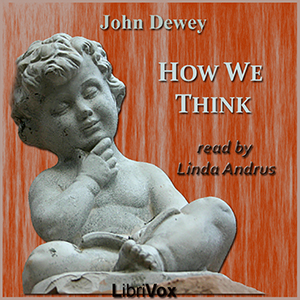
How We Think by John Dewey. 🎧
Dewey equates intelligence with the ability to suspend judgement instead of accepting dogma immediately. Thinking, then entails waiting to make a final conclusion while alternating between inducing to deducing – moving from particulars to ideas to particulars again. Here’s his example:
A commonplace illustration may enforce the points of this formula. A man who has left his rooms in order finds them upon his return in a state of confusion, articles being scattered at random. Automatically, the notion comes to his mind that burglary would account for the disorder. He has not seen the burglars; their presence is not a fact of observation, but is a thought, an idea. Moreover, the man has no special burglars in mind; it is the relation, the meaning of burglary—something general—that comes to mind. The state of his room is perceived and is particular, definite,—exactly as it is; burglars are inferred, and have a general status. The state of the room is a fact, certain and speaking for itself; the presence of burglars is a possible meaning which may explain the facts.
So far there is an inductive tendency, suggested by particular and present facts. In the same inductive way, it occurs to him that his children are mischievous, and that they may have thrown the things about. This rival hypothesis (or conditional principle of explanation) prevents him from dogmatically accepting the first suggestion. Judgment is held in suspense and a positive conclusion postponed.
Then deductive movement begins. Further observations, recollections, reasonings are conducted on the basis of a development of the ideas suggested: if burglars were responsible, such and such things would have happened; articles of value would be missing. Here the man is going from a general principle or relation to special features that accompany it, to particulars,—not back, however, merely to the original particulars (which would be fruitless or take him in a circle), but to new details, the actual discovery or nondiscovery of which will test the principle. The man turns to a box of valuables; some things are gone; some, however, are still there. Perhaps he has himself removed the missing articles, but has forgotten it. His experiment is not a decisive test. He thinks of the silver in the sideboard—the children would not have taken that nor would he absent-mindedly have changed its place. He looks; all the solid ware is gone. The conception of burglars is confirmed; examination of windows and doors shows that they have been tampered with. Belief culminates; the original isolated facts have been woven into a coherent fabric. The idea first suggested (inductively) has been employed to reason out hypothetically certain additional particulars not yet experienced, that ought to be there, if the suggestion is correct. Then new acts of observation have shown that the particulars theoretically called for are present, and by this process the hypothesis is strengthened, corroborated. This moving back and forth between the observed facts and the conditional idea is kept up till a coherent experience of an object is substituted for the experience of conflicting details—or else the whole matter is given up as a bad job.